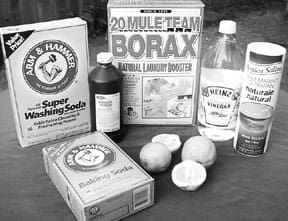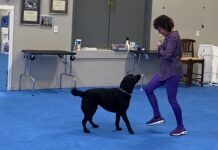[Updated December 10, 2018]
Editor’s note: We mentioned several issues ago that we were preparing an article about nontoxic household cleaning products. Shortly afterward, we received a message from Sue Bozinovski and Valerie Robson, who described themselves as fans of WDJ, raw feeding proponents, and concerned mothers, who educated themselves about the dangers of household chemicals – and mastered the art of making effective nontoxic alternatives! They enthusiastically volunteered for the job of writing the article, and we were more than happy to turn it over to these competent “reader experts.”
SAFE CLEANING PRODUCTS FOR DOGS: OVERVIEW
1. Start shopping for ingredients listed on the next page. Many nontoxic cleaning components are available in any large supermarket. Others may be found only in health food or specialty stores.
2. Mix up a safe replacement for your most toxic household cleaning products first. Or focus initially on areas that can affect your dog the most, such as floors and carpets.
3. Use essential oils sparingly if you have a cat or toy dog; these animals are more sensitive.
Most people, even those who do not like to clean, enjoy the feeling of a sparkling fresh home. We take pride in the way our home looks and smells after we have spritzed, scrubbed, wiped, polished, vacuumed, and mopped. But for many of us, we have simply exchanged the dirt and grime for a coating of some of the most dangerous chemicals on the planet. And these chemicals are undoubtedly harmful to ourselves, our families, and our pets.
Take a look at those household cleaners under your sink and in your laundry room. Many of them list a plethora of toxic ingredients including petroleum distillates, mineral spirits, formaldehyde, and others that have been proven carcinogenic and mutagenetic (see below).
As concerned consumers we can try to purchase safe and healthy products, but it is not always easy. Many products on the market today are considered proprietary and closely guard their formulas as trade secrets, making it impossible for us to judge their contents. Did you know the words “nontoxic” and “biodegradable” have no standard definition under the law? Often, they are used simply as advertising gimmicks! (For more information about product labeling, see “How To Select Safe Dog Care Products and Cleaners for Your Home“.)
About 18 months ago, after reading a number of studies and articles about the dangers of cleaning products, we decided to practice “Natural Home Cleaning” – not only for our families, but also for the benefit of our pets. After all, our dogs and cats spend most of their time on the carpets, on their laundered beds, or eating food we’ve prepared on kitchen counters.
We have learned it is possible to clean our homes naturally, making a much safer place for our children, our pets, ourselves, and the environment. We have also learned that making our own cleaning products does not have to be time-intensive. Both of us have homes, management-level jobs, families, pets, and numerous outside activities. We discovered that with a few simple and cost-effective ingredients, we could make a diverse group of cleaning products. And, by adding essential oils chosen because we like their aromas or other properties, we can personalize our cleaning products.
Believe it – natural home cleaning is healthier, less expensive, and much more fun than doing it the way most of us were taught. In fact, natural home products can even extend the life of our expensive home investments (such as the wall-to-wall carpeting, ceramic tile floors, etc.), in addition to being healthier for our loved ones.
Natural Cleaning Supplies – Safe for Dogs
As we experimented and learned about the cleaning qualities of natural products, we developed a list of supplies that are most useful to have on hand. These items include:
White vinegar – Used in many formulations to clean and disinfect.
Baking soda – We recommend buying the largest box available.
Washing soda – This product is often found near the laundry detergents in supermarkets and health food stores.
Borax – Great for strengthening cleaning power!
Mild soap – Available in flakes and liquid – NOT detergent! Many products today are detergents made from petroleum distillates, which are both toxic and nonrenewable. Vegetable-based soap made from coconut or olive oil is known as castile soap and may be found in health food stores and some supermarkets. It is sometimes difficult to find unscented, but if you want to use your own favorite essential oils this is critical.
Essential oils – These differ from fragrance or perfume oils. Essential oils, found in health food stores, some specialty shops, and on the Internet, are volatile oils of plants.
(Note: If you have cats or toy dog breeds, skip the essential oils in any of our recipes until you have checked with your holistic veterinarian; these animals are particularly sensitive to essential oils. Also, the use of essential oils may interfere with the action of homeopathic medicines. If you use homeopathy, check with your homeopath before using any essential oil in your home.)
Containers – Spray bottles and other storage containers come in plastic and glass (we prefer the latter) in a variety of sizes. They can be found in supermarkets, health food stores, and container stores at very low cost.
Carpet and Floors
Our dogs spend much of their day on our carpets. Having no carpet to collect all the day-to-day gunk is probably the healthiest option, however, many homes have wall-to-wall carpeting or large room-sized rugs. So our job is to clean our carpets in the healthiest, but also in the least destructive, manner. You can deodorize, disinfect, or clean carpets depending on your current need.
If you just need to freshen your carpet, a simple mixture of baking soda and borax (equal parts) sprinkled on the carpet and vacuumed up will do the trick. To make this even more effective you can add several drops of your favorite essential oil to the powdered mix. Lemongrass and citronella oils are excellent choices if you are concerned about fleas. To make a safe carpet shampoo, the following recipe (from The Naturally Clean Home by Karyn Siegel-Maier) will cover a 10′ x 13′ room.
Rosemary-Lavender Dog-Safe Carpet Shampoo
2 cups baking soda
½ cup soap flakes (you can substitute with Borax)
20 drops lavender essential oil
8 drops rosemary essential oil
½ cup white vinegar
2 cups warm water
Loosen dirt by vacuuming or sweeping carpet. Combine baking soda, soap flakes, and essential oils in a large glass or stainless steel bowl, breaking up clumps. Sprinkle this mixture on the carpet. In a bucket, mix the vinegar and warm water. Dip a clean sponge mop into the bucket, squeezing out the excess liquid. Go over the carpet with the sponge mop working in sections. Wait one hour and vacuum.
For wood floors, the best cleaner is a mixture of equal parts warm water and white vinegar. Combine in a spray bottle; spritz a small section and dry mop. To three cups of this mixture you can add 15 – 20 drops of an essential oil of your choice. We like peppermint since it smells great, will kill germs and keeps mice away!
For cleaning tile or vinyl floors, mix a gallon of hot water and 2 – 3 tablespoons of a liquid Castile soap. To this mix you can add either lemon (great in the kitchen), or pine essential oil. Use 10-20 drops of oil and feel free to mix oils.
Dip your mop into the mixture, squeeze out the excess water and mop in small sections. The best part of this mix is there is no rinsing involved and the residue won’t hurt your dog if she happens to lick the floor when you are done.
Cleaning Kitchen Counters
Especially important are the areas where we prepare our own, and our dogs’ food. About a year ago, Valerie switched Samson and Carmel, both rescue Golden Retrievers, over to a raw food diet. For a time she went into disinfectant overdrive, cleaning the kitchen countertops with all sorts of commercial preparations. She was extremely excited on the day she discovered lavender and lemon essential oils. These oils are antibacterial, antifungal, antiviral, and antibiotic.
To clean counters, all you need is hot water, white vinegar, borax, and the essential oil(s) of your choice. For each cup of hot water use one tablespoon of vinegar and a scant teaspoon of borax. Add about 10 – 12 drops of essential oil. Remember, essential oils are potent; use sparingly.
To scour and disinfect wood chopping blocks, mix a couple of tablespoons of salt (any salt will do, but sea salt is grittier) and a like amount of fresh lemon juice and vigorously rub the mixture into the wood (it helps to wear gloves). Let this soak for 10-15 minutes, then rinse while scrubbing under hot water. Allow the wood to dry thoroughly.
Safe Bathroom Cleaning Supplies
Who among us has a dog that has never taken a drink out of the toilet? Given the ingredients in most toilet bowl cleaners, you invite long-term health problems for your dog with even the occasional lapper.
Instead, make your own germproof toilet bowl cleaner by combining the following in one of your spray bottles: one cup water, three tablespoons of liquid Castile soap, 20 drops of tea tree oil, and 7-10 drops of eucalyptus oil. If you have a hard water ring in the bowl, combine borax and vinegar with lemon essential oil, mix in a container and pour into the bowl. Let it sit undisturbed for about 12 hours and the stains should be gone.
Laundering Dog Bedding
Keeping our dogs’ beds clean whether we live in the city or the country is an ongoing chore. Since our dogs spend a lot of time lounging or snoozing in their dog beds, any cleaning agent is easily transmitted to the dog’s skin and coat. We recommend the use of natural laundry soap easily made at home. For example, the recipe for basic laundry soap powder is quite easy and smells wonderful when essential oils are added: Mix equal parts washing soda, baking soda, and real soap flakes (grated pure Castile soap). For top loading washers, use ½ cup of the mix; for a front loader use ¼ cup.
To deodorize and soften the fabric, use ¼ cup white vinegar scented with a few drops of your favorite essential oil. See the essential oils chart for properties and scents of the various oils. Experiment with different oils! When extra whitening power is needed, for instance, to remove a urine or food stain, mix up some chlorine-free bleach. Mix one part hydrogen peroxide to 8 parts water. Soak the item for 5-30 minutes. Rinse and wash if needed.
Cleaning Product Conclusions
In case you haven’t sensed it by now, we are very excited about the possibilities that natural products offer in the way of home cleaning. We can still get our homes spic and span, while keeping our families, our pets, and the environment safe.
It’s easy to switch gradually to natural cleaning products. As you run out of existing supplies, start buying natural products such as borax, hydrogen peroxide, vinegar, and baking soda. The quantities needed for home cleaning will be somewhat greater than normal use, but purchasing larger quantities costs less per unit.
We suggest you pick one or two areas that you want to focus on, for example, your dog’s bedding and the kitchen countertops, and get the items needed for making natural cleaning products. Start by purchasing two or three essential oils that have the cleaning and disinfecting power or the scents you like.
And if you don’t feel you have the time to create your own home cleaning products, there are several companies now offering environmentally friendly cleaning products. It is better, we feel, to purchase nontoxic pre-made cleaning products, than to continue to buy the usual toxic cleaning products we have used for decades. Check the shelves of your local health food store for products made by companies such as Seventh Generation, Ecover, Life Tree, and Naturally Yours.
Anybody can do this. We owe it to ourselves, our families, and our pets to make our homes as toxin-free as possible. We want to spend as many years with our loved ones as we can. A naturally cleaned home will help us toward that end.
Need some tips on cleaning up the messes dogs make? Click here!
Sue Bozinovski and Valerie Robson are Whole Dog Journal subscribers who live in Conifer, Colorado.







Baking soda = “a BIG no-no!,” according to our vet….
Since it can be ingested, inhaled, or absorbed through their coats, we also were admonished with the “how could you expose them to [*gasp*] BAKING SODA?!” and “You use it to clean around your house?! You may as well have stepped on board the ‘Murder Express!'”
Geez, the woman had me scared to even bake a cake in the fear that one of my dogs may catch a whiff. Perhaps using it to wash dog beds in, or sprinkling on the carpet to sit for 15 minutes before vaccuming may not be the best idea. But please, do your research and talk to your own (hopefully non-nutty) veterinarian before deciding to “buy the biggest box.” I did have a dog experience what seemed to be hallucinations, extreme fear, and disorientation as a result of sodium bicarbonate poisoning.
I’ll probably hear that lecture in my sleep for as long as I live.
Thank you for all the information very helpful..